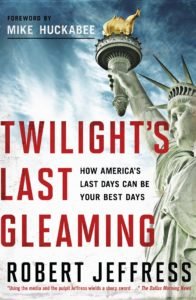To be upfront with you, I asked to review this book because I have strong and mostly negative views of Christian leaders who use their pulpits for political influence and based on what I’d seen of Pastor Jeffress in the news and the title of the book I was seeing red flags. After reading the book, though, most of the alarms were false.

Twilight’s Last Gleaming: How America’s Last Days Can Be Your Best Days
by Pastor Robert Jeffress
Worthy March 2012
Christian leaders who set aside their faith for political expediency and influence are more than a pet peeve for me –they are a hindrance to the Gospel of Christ. For instance, when Christian leaders, so-called champions of “Family Values,” endorse Newt Gingrich, an admitted adulterer who has been married three times instead of others in the primary who also claim to be Christian and happen to have been married to the same wife for decades like Ron Paul or Rick Santorum something smells bad. And the non-Christians out there see the hypocrisy and see nothing in Christianity worth their time.
In the news, all I’d seen from Pastor Jeffress were his comments about Muslims and Mitt Romney’s Mormonism tied to his endorsement of Rick Perry. Frankly, he was portrayed as an attention grabbing, right winger. I admit that I bought into that a bit because of my preconception that most pastors, when they step out on to the national stage and start talking politics, are focused more on politics than God. Along with a title talking up the end of America, all the evidence seemed to put the pastor squarely into that same box. But what I found –and this shouldn’t come as much of a surprise –is that the media has not been fair at all to the pastor. And, possibly, pastor Jeffress hasn’t been very fair to himself either.
The book is not about the end of America, but actually a call for Christians to take up our God given role as salt and light in the world. The pastor sees our calling as salt as a calling to preserve culture as long as we can by working to pass laws that are in line with the moral precepts of the Bible. So the call to be salt is fulfilled by a calling to be “culture warriors” for Christian values in America.
He makes compelling arguments. A favorite section for me was Pastor Jeffress’ passages on what “true tolerance” and what passes for tolerance today. To have true tolerance for something, he says, you have to disagree with it. Brilliant and right. But in today’s America tolerance is completely misunderstood as agreement. Christians can be salt by remembering and practicing true tolerance.
Another argument made by the pastor I found persuasive is his argument that as Americans –with a right, and responsibility to vote –have a responsibility to vote our conscience based on our faith. Many people, Pastor Jeffress points out, believe that we cannot or are not allowed to make Christian faith a litmus test for people we vote for because of “Separation of Church and State.” Pastor Jeffress shatters this myth by pointing out that everyone has a litmus test, or bias, to vote for those who would best represent our beliefs and he also makes the argument that excluding faith in decision making is not a part of the law or a prescription that the founders would have understood or agreed to. He makes this case primarily based on the writings of the first Chief Justice of the Supreme Court who basically says that we should vote for Christians because of the superiority of Biblical values.
But I didn’t find myself agreeing with everything the pastor said. For instance, I think some of Pastor Jeffress’ complaints are short sighted. Say that it was a bad idea to take prayer out of public schools, which he argues is Explosion #1 in the implosion of the United States. If we put prayer back in, won’t the prayer time have to be pluralistic or give equal time to non-Christian beliefs since it was being done in public school? (The answer is, “yes.”) As much as I like the idea of kids praying, I don’t want a Muslim or Hindu or Atheist leading prayer/ meditation time at my child’s school –something that would happen in our pluralistic country. And, as so many church marquees show, “As long as there are tests, there will always be prayer in school.”
Pastor Jeffress is right to call out abortion as Explosion #2 and sheds light on the pro-abortion agenda by quoting arguments made before the Supreme Court that clearly show that abortionists know that they are killing a human but find it less relevant than the mother’s choice. But Explosion #3, legalizing gay sex in Texas, is much less clear and represents the struggles of Christians over this topic of salting the culture around them.
Should the government keep laws about sexuality in the privacy of a home? Pastor Jeffress makes the argument that the government does make laws about what can happen in the bedroom all the time. For instance, it is illegal to have sexual relations with your daughter or son, or with animals. The question is always where the line is drawn. Many Christians will take a libertarian view that it isn’t our business whether two men have sex in their home. Jeffress argues that it is our business because it is dangerous to the men, because it’s an unnatural act (and sin), and because the government makes rules prohibiting these kinds of acts all the time. In fact, the current debate over Gay Marriage comes down to not the question of whether the government should legislate morality in the bedroom, but where the government should draw the line. I’m not a fan of everything Molotov Mitchell does, but this video on Drawing the Line shows that, when you get right down to it, everyone draws the line somewhere. Jeffress is making a case for drawing it prior to legalizing homosexual sex.
While I don’t agree with everything that Pastor Jeffress says I did come to respect his opinions and believe that he has a Biblically informed world view. One of the greatest parts of being the Body of Christ is that God has given us different roles and different methods to accomplish His plans. If Pastor Jeffress is able to help in the battle to overturn Roe v. Wade then God bless him! On the other hand, if he never succeeds in some of the goals he may have, which I consider secondary non-essentials like prayer in school, then that’s fine too. For me, I will respect and love my brother who fights the way that he believes God has called him to and pray for him to ensure that he truly is sticking to the things God asks and not indulging his personal goals.
And then I’ll pray that I do the same.
A great read with excellent incite by an author who does a very good job justifying his actions through his faith in God. Highly recommended.
Scott Asher blogs about life as he sees it at Ashertopia.com.





Recent Comments